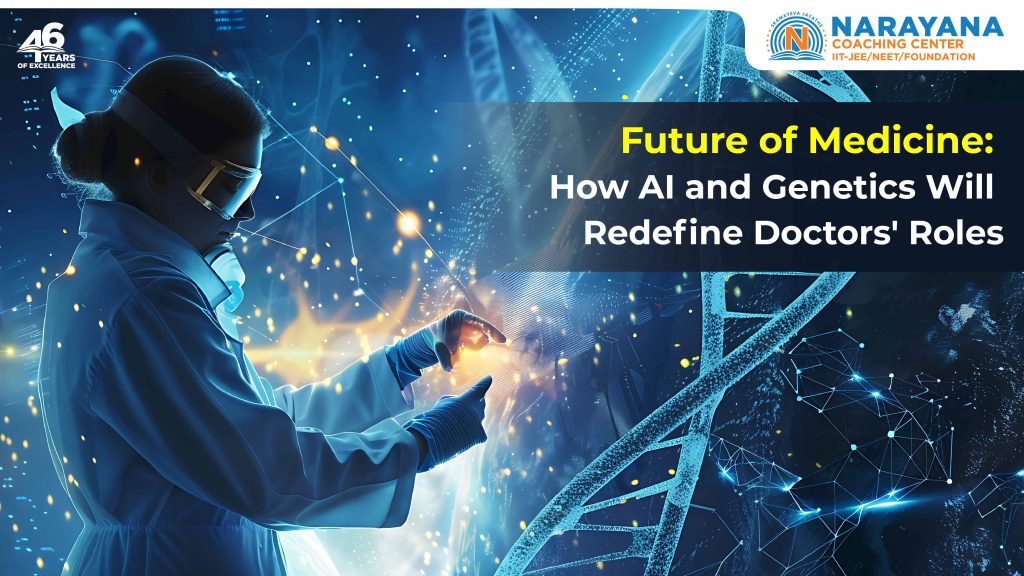
The medical landscape is undergoing a seismic shift. From robotic surgeries to AI-powered diagnostics and gene-editing breakthroughs, the fusion of artificial intelligence and genetics is revolutionizing how diseases are diagnosed, treated, and even prevented. For NEET aspirants—the future medical professionals of India—understanding these advancements is not just intellectually enriching but strategically essential.
The Rise of Artificial Intelligence in Healthcare
AI is no longer science fiction. It has become a powerful ally in medicine, with capabilities that include:
1. AI in Diagnostics
AI algorithms can analyze medical images, pathology slides, and electronic health records (EHRs) with astonishing accuracy. Tools like Google’s DeepMind and IBM Watson are already assisting radiologists in detecting early signs of cancer and other anomalies that human eyes might miss.
2. Predictive Analytics and Patient Monitoring
AI can forecast disease progression, monitor vital signs in real-time through wearable devices, and even predict hospital readmission risks. This ensures proactive care and minimizes emergencies.
3. Virtual Health Assistants
Chatbots and AI-powered assistants now help triage patients, schedule appointments, and provide basic medical advice, enhancing patient engagement and reducing clinical workloads.
The Genetic Revolution: Medicine at a Molecular Level
Genetics is reshaping our understanding of diseases, opening doors to personalized and precision medicine.
4. Genomic Sequencing
Falling costs of genome sequencing have made it feasible to analyze a patient’s DNA and identify predispositions to diseases like cancer, Alzheimer’s, and diabetes.
5. Gene Editing (CRISPR)
CRISPR-Cas9 allows scientists to ‘cut and paste’ sections of DNA. This has huge implications for treating genetic disorders like sickle cell anemia, muscular dystrophy, and even some forms of cancer.
6. Pharmacogenomics
This field examines how genes affect a person’s response to drugs, enabling doctors to prescribe medications that are most effective for individual patients.
How Doctors’ Roles Are Evolving
While technology automates certain aspects of medicine, it is also transforming what it means to be a doctor.
7. From Diagnosis to Decision-Making
AI may suggest diagnoses, but doctors remain responsible for interpreting AI output within the broader context of a patient’s history, lifestyle, and emotional state. The human element remains indispensable.
8. Enhanced Communication and Empathy
With AI handling administrative and routine diagnostic tasks, doctors can focus more on building trust, offering emotional support, and making complex ethical decisions.
9. Multidisciplinary Expertise
Tomorrow’s doctors must understand bioinformatics, data science, and genetics. The MBBS curriculum may evolve to include these interdisciplinary subjects.
What NEET Aspirants Should Prepare For
If you’re preparing for NEET, you are stepping into a medical world far different from today’s.
10. Need for Technological Proficiency
Being tech-savvy will no longer be optional. From operating advanced diagnostic tools to interpreting genomic data, a command over tech will be expected.
11. Lifelong Learning
Rapid advancements mean that doctors must continuously update their knowledge post-MBBS. NEET aspirants should cultivate curiosity and adaptability early on.
12. Bioethics and AI
Understanding the ethical considerations of using AI and genetic data—such as data privacy, consent, and equitable access—will become part of a doctor’s responsibilities.
Challenges and Considerations
13. Accessibility and Affordability
While AI and genetic tools can improve care, they may initially be expensive and inaccessible to rural populations. Doctors will need to advocate for equitable healthcare distribution.
14. Job Displacement Myths
AI is not here to replace doctors, but to augment them. Routine tasks may be automated, but the judgment, empathy, and communication skills of a human doctor remain irreplaceable.
15. Regulatory and Legal Frameworks
Laws will need to catch up with technology. Doctors will play a role in shaping policies that govern AI tools and genetic interventions.
A Future of Synergy
In the future, a typical diagnosis may start with AI, followed by a genomics-informed treatment plan, and then executed with robotic precision—all overseen by a doctor who combines clinical expertise with technological mastery and human compassion.
For NEET aspirants, this is an exciting time. You’re not just preparing for an exam; you’re preparing to enter a profession that is expanding in scope, responsibility, and impact. Understanding AI and genetics will empower you to be a more informed, adaptable, and visionary healthcare provider.
Conclusion
The convergence of AI and genetics is not just a trend—it’s the future of medicine. For aspiring doctors, embracing this transformation is vital. NEET is just the beginning; the real journey involves continuous learning and evolving with the changing face of medicine. By mastering the core subjects while staying informed about these technological shifts, you will be well-equipped to thrive in a healthcare system that promises to be more personalized, predictive, and powerful than ever before.
FAQs
- Will AI replace doctors in the future?
No. AI will augment doctors’ capabilities, not replace them. Human judgment and empathy are irreplaceable in healthcare. - How important is genetics in future medical practice?
Very important. Genetics enables personalized treatment plans and better understanding of disease predispositions. - Should NEET aspirants learn AI and coding?
While not essential for NEET, having basic knowledge of AI and data analysis will be beneficial in medical education and practice. - Will the NEET syllabus include AI or genetics?
Not currently, but future updates to the medical curriculum may integrate topics related to biotechnology, bioinformatics, and AI. - What career options will emerge with AI and genetics in medicine?
New roles include clinical bioinformaticians, AI-integrated surgeons, genetic counselors, and medical data analysts.
